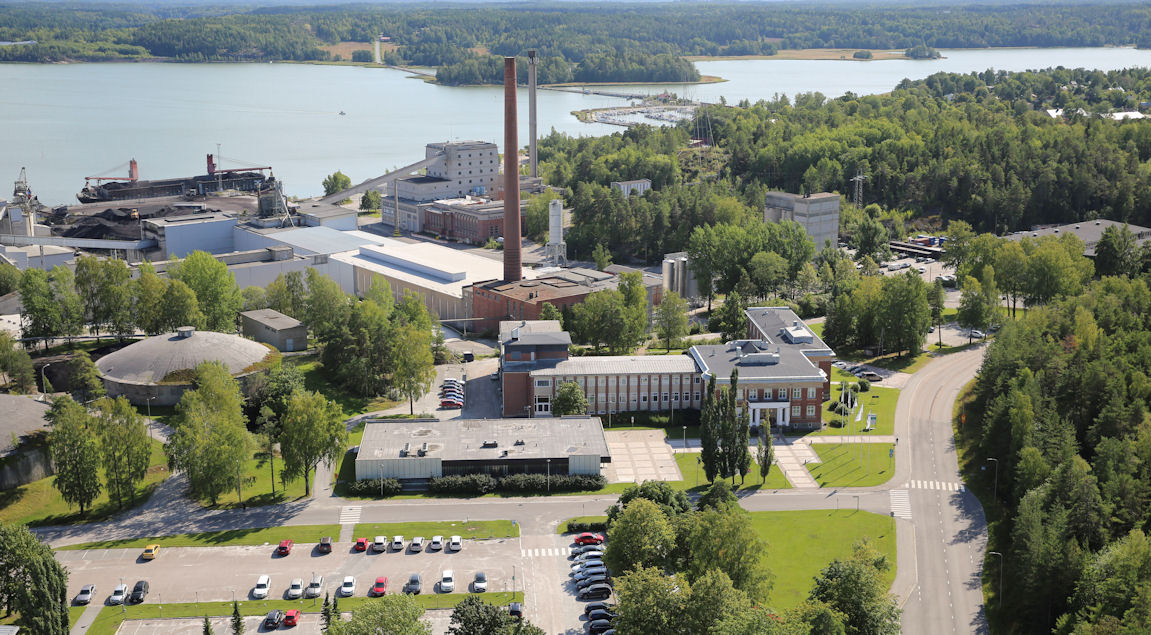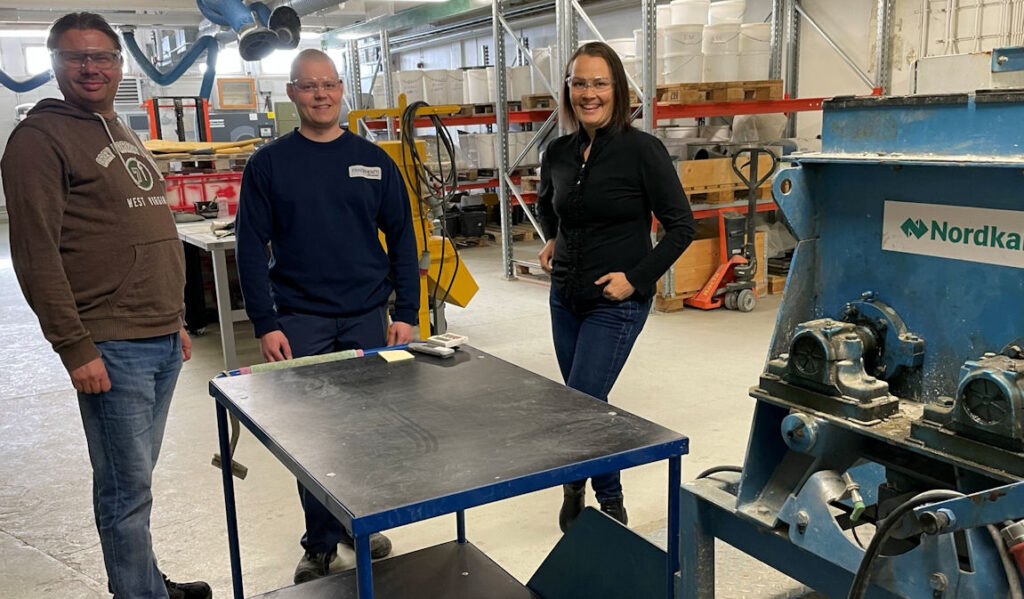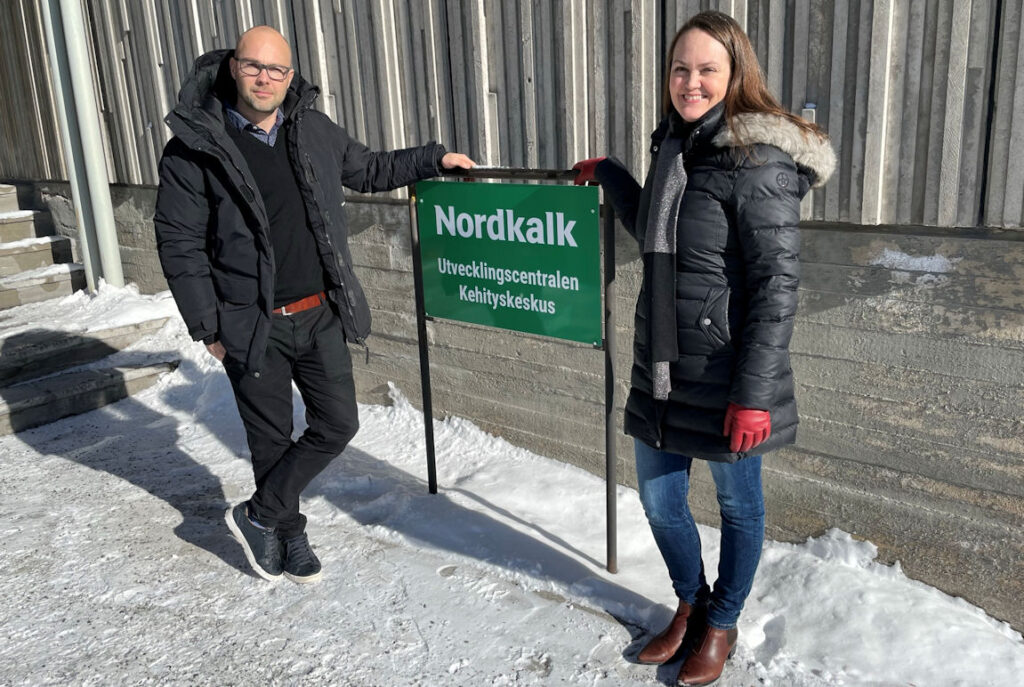
The large industrial companies located in Pargas – Finnsementti, Nordkalk, Paroc and Saint-Gobain Finland – constantly develop new circular products. Some are created in co-operation within the 3C cluster, which promotes circular economy processes in construction in the Turku region.
The group of construction material companies in Pargas has grown around Nordkalk’s limestone quarry. The companies share a common history, and a common goal: carbon-neutral future.
“Circular economy is one way to reduce emissions within the whole construction chain. It requires the different actors to cooperate and share information. Here in Pargas, the neighbouring companies have a tradition of co-operation, which the current 3C Cluster activities have strengthened”, says Nordkalk’s R&D Director Mathias Snåre. Nordkalk is the front-runner company for the business co-operation of 3C, and Turku Science Park coordinates the activities.
Tommy Ranta, Production Director of Finnsementti, confirms Mathias’ view by giving a practical example: “We are currently investigating possibilities to use Nordkalk’s tailings, a side stream of the flotation process, in cement production in Lappeenranta. It has been tested about a decade ago, and we are retesting it now due to the increased significance of circular economy processes.”

Tommy Ranta says that the tailings would make up a tiny part of the raw material for cement, and it can be used only in the dry season of the year. Even as such, it would be a useful addition to the circular raw materials. It will also save virgin limestone, which is the main raw material of cement. Finnsementti is the only cement producer in Finland, with production plants next to Nordkalk’s quarries in Lappeenranta and Pargas.
Nordkalk, in turn, has tested two of Finnsementti’s side streams in process water neutralisation and soil improvement, with good results. In this case, the critical issue is the adequacy of the side streams.
Increasing demand for low-carbon products
Finnsementti launched a new low-carbon cement product called Kolmossementti in the late summer of 2021. It is a CEM III cement with high standard strength, including a minimum 40% of blastfurnace slag, an industrial side stream. Last year it was the cement product with fastest growing sales in Finnsementti. In addition to being an environmentally sustainable alternative, its good technical properties are appreciated in the ready-mix concrete industry.
A small carbon footprint is an increasingly important sales criteria in the whole construction chain. Demands for mitigation of climate change and low-carbon construction are included in the new Building Act of 2025, which was approved by the Finnish parliament earlier this March.
Over the past months, Finnsementti has developed a new product that is an even lower-carbon option than the existing Kolmossementti. The new type CEM III/B cement will be launched to the markets during the spring.
Paroc, which produces insulation solutions, is also preparing to launch a new product in the spring. Last year the company introduced its first carbon neutral insulation slab made of stone wool, PAROC Natura Lana. The product benefits from the use of recycled fibres, low-carbon production technology, use of green electricity, and partial emission compensation.
“Carbon-neutral insulation has attracted a lot of interest. Environmentally conscious customers and contractors use the product in frame constructions and pitched roofs. We are preparing to launch a new Natura product in the spring, and we look forward to sharing more news about low-carbon products in the early fall of 2023, says Paroc’s Sustainability Program Lead Ismo Kuokkanen.
Nordkalk started to develop its soil stabilisation products to reduce their carbon footprint once the new cement type became available. The cement in all Nordkalk Terra products was replaced by CEM III in the spring of 2022, and their carbon footprint decreased 8%–24%, depending on the product. Mixture optimisation and stabilisation tests were continued in the Topinoja area in Turku and the Malmi airport area in Helsinki, among others. Laboratory tests have been performed with mixtures including a completely new side stream, which will enter the field test phase in the spring.
At Saint-Gobain Finland, development work continues to utilise mineral wool waste: “For us, it is essential to reduce our own process waste and utilise it as a raw material that produces added value. It is possible to use it in Isover, Leca and Weber products. Mineral wool waste is increasingly utilised in the production plants, and we are trying to find the best possible utilisation for the surplus portion of the wool waste. One possible target is, for example, the replacement of virgin raw material in cement-based products,” says circular economy engineer Tuomas Kohvakka.
The utilisation of mineral wool waste was studied in an international innovation project WOOL2LOOP, which was coordinated by Saint-Gobain Finland and ended in November. The project succeeded in milling binding material from recycled mineral wool from demolition sites and process waste from insulation products. The milled material can be used in geopolymers, which can replace concrete.
A dry-mix concrete product was piloted in the project. Tuomas Kohvakka describes the pilot as a learning experience with milled mineral wool waste. It provided Saint-Gobain Finland with good knowledge of the requirements regarding the raw material as well as the production process. The company is not, however, planning to launch a geopolymer product in a near future.
Sharing ideas and side streams
The target of the 3C cluster (Circular Materials and Solutions for Construction Industry) is to promote new products and business operations based on the circular economy concept. The cluster gathers construction and circular economy experts from companies, institutes of higher education, and the public sector to share project ideas and test them in practice.

The 3C cluster was founded in 2020, but due to the pandemic, ideas have been exchanged mostly online. A face-to-face meeting finally took place last September in a seminar organised by Nordkalk. It has led to new cooperation opportunities; Paroc, for example, has studied the utilisation of its side streams with two other companies since the meeting.
In recent months, the members of the 3C Cluster have met in webinars called Taxonomy Thursdays, where the European Union’s sustainable finance classification system, or taxonomy, is discussed. It creates a set of criteria for defining environmentally sustainable business. The webinars are organised by Turku Science Park, and they have typically gathered 30–50 listeners online.
“These types of events are most welcome. Questions from other participants allow one to get deeper into the issue than what would be possible by just reading about it by yourself”, says Tuomas Kohvakka.
Text and photos: Anne Foley
We use cookies to give you the best internet experience. By giving consent, you accept the use of cookies in accordance with our cookie policy.

When you visit any web site, it may store or retrieve information on your browser, mostly in the form of cookies. Control your personal Cookie Services here.